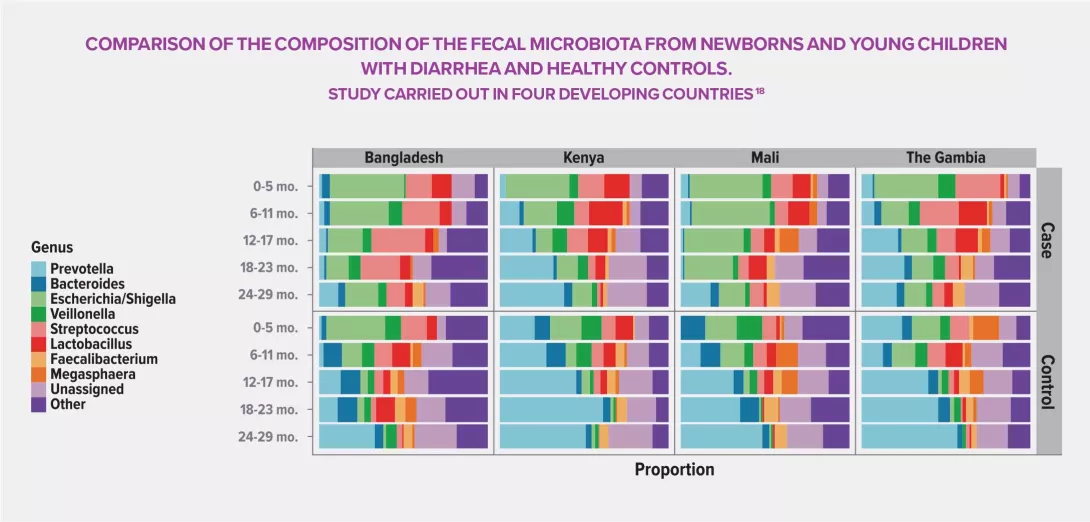Infectious diarrhea and intestinal microbiota
A close relationship has been established between childhood gastrointestinal disorders and intestinal microbiota. The composition of the intestinal microbiota impacts the risk of developing certain disorders, and conversely, a dysbiosis caused by a gastrointestinal disorder can play a role in promoting, worsening or increasing the recurrence of the underlying disorder. Research is focused on gaining a better knowledge of etiopathogenesis in order to develop new therapeutic and prophylactic solutions.
Lay public section
Find here your dedicated section
Sources
This article is based on scientific information
Sections

About this article
The fight against infectious diarrhea is a priority of healthcare systems in developing countries, since this pathology is the second cause of child mortality in these regions. Describing the intestinal microbiota and its dysbioses are part of this fight and could help offer personalized treatments.
RISKS ASSOCIATED TO DIARRHEA
Recurrent or prolonged diarrhea episodes increase the risk of malnutrition and stunted growth. They are also associated to numerous comorbidities: cognitive disorders, cardiovascular diseases, glucose intolerance, etc. Despite a regular decrease, near 525,000 children under 5 years of age die every year in the world. Understanding the etiology of diarrhea is a health priority, but the wide variety of types and potential causes requires further investigation, especially in terms of correlation with the intestinal microbiota. A recent study focused on Vietnamese population was added to the existing body of scientific literature on infectious diarrhea. It characterized the bacterial communities of 145 children with diarrhea and 54 controls.17

ETIOLOGIC AGENTS WERE IDENTIFIED
Bacterial analysis of fecal samples revealed four major types of bacterial predominance in children with diarrhea: Bifidobacterium, Bacteroides, Streptococcus and Escherichia. The first two categories, usually asymptomatic, are close to the composition of the microbiota of control children. Predominance of Streptococcus and Escherichia in the microbiota of children who had the most severe symptoms, confirmed previous studies that associated these microorganisms with a higher risk of gastrointestinal disorders. Bacterial depletion was also observed in all categories. Nineteen taxa are concerned (mainly belonging to the Clostridiales and Erysipelotrichales orders) and especially Blautia hansenji which is known for its ability to produce SCFA19, essential to homeostasis.
INDIVIDUAL VULNERABILITIES
Age, nutritional status, intake of breast milk and etiology seem to contribute to the composition of bacterial communities during the early phase of diarrhea episodes. Streptococcus are more largely associated to young children (under 2) and bacterial infections, while Escherichia are found in older children and/or children with poor nutritional status. This extensive characterization is part of the analysis of the complex influences of infectious diarrheas on the intestinal microbiota and guides research towards new therapeutic approaches.
KEY FIGURES FOR DIARRHEA
Definition: passage of three or more loose or watery stools per day
- Acute watery diarrhea lasting several hours or days
- Watery and bloody diarrhea, or dysentery
- Persistent diarrhea (14 or more consecutive days)
There are about 1.7 billion cases of diarrhea annually in children in the world.
2nd cause of death and major cause of malnutrition in children under.
525,000 deaths per year of children aged 5 or less in the world.
[Source] : WHO: Fact sheets on diarrhoeal-disease, mai 2017
17 The HC, Florez de Sessions P, Jie S, et al. Assessing gut microbiota perturbations during the early phase of infectious diarrhea in Vietnamese children. Gut Microbes. 2018;9(1):38-54.
18 Pop M, Walker AW, Paulson J, et al. Diarrhea in young children from low-income countries leads to large-scale alterations in intestinal microbiota composition. Genome Biol. 2014;15(6):R76.
19 Short-chain fatty acids. They are products of carbohydrate fermentation (organic anions and saturated fatty acids) carried out by anaerobic bacteria in the colon






